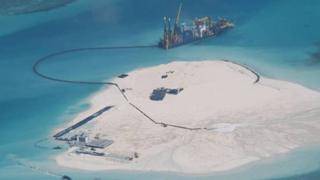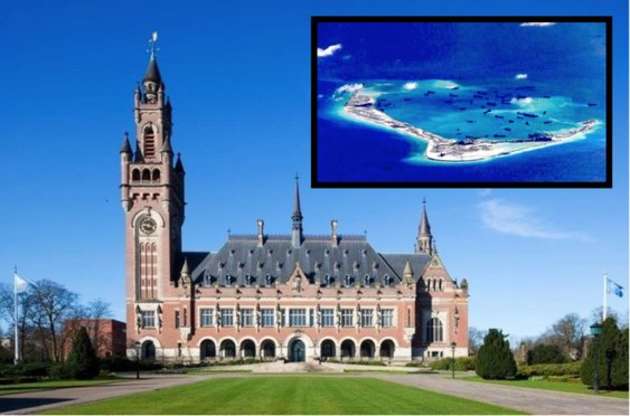Granny says dey need some regime change in China...
US group warns of ‘storm’ to hit South China Sea
Sun, Oct 04, 2015 - CHINESE PERCEPTION: Heritage Foundation fellow Dean Cheng said inaction by the US over Chinese island-building could cause Beijing to see it as weak
See also:
China warns US on S China Sea
Sun, Oct 11, 2015 - PATROLS: Washington says it does not recognize Beijing’s sovereignty over several islands and that the US Navy will continue to operate where international law allows
US group warns of ‘storm’ to hit South China Sea
Sun, Oct 04, 2015 - CHINESE PERCEPTION: Heritage Foundation fellow Dean Cheng said inaction by the US over Chinese island-building could cause Beijing to see it as weak
There is a military storm brewing in the South China Sea and it will involve Taiwan, a US national defense and strategic planning consultancy on Friday told a Washington conference. “China is maneuvering and building up its military forces with clear intent,” Global Strategies and Transformation president Paul Giarra said. Giarra told the Heritage Foundation think tank that Beijing had convinced the US not to consider the nation in the context of geography or military operations. “We are thinking of Taiwan as a political problem that we want to go away,” he said at the conference, titled “Taiwan in the South China Sea.” “The Chinese have convinced us that in order to maintain peace and stability in the Taiwan Strait, all we have to do is keep Taiwan quiet,” Giarra said. “The trouble is, the situation in the Taiwan Strait is neither peaceful nor stable,” he said. “Taiwan, in its most appropriate military operational perspective, is a key geostrategic bastion and this is what the Chinese don’t want us to think about.”
Giarra said that China wants to minimize the Taiwan issue and Washington to think of the nation as nothing but a distraction. However, in geostrategic and military operational terms, securing Taiwan would be a great advantage, he said. “By virtue of its location, Taiwan challenges the People’s Republic of China’s control of its broad ocean approaches,” Giarra said. He said this “compelling” geostrategic reality had been lost in the propaganda, psychological and political warfare going on between China and the rest of the world. “Either Taiwan is going to be on our side and an advantage for us or in the blink of an eye political change could make Taiwan an advantage for China,” he said. China is building up its air, naval and missile forces to take control of the South China Sea, he added. “They are trying to convince us that if we will only go along, we will all get rich and it will all be peaceful,” he said.
Heritage Foundation senior research fellow Dean Cheng said the “first island chain” is a barrier to China in the hands of adversaries, but would be a shield if most of it was controlled by Beijing. “What we do in the South China Sea will effect how Beijing sees us and what China is doing there should affect how we perceive them,” Cheng said. He said that with the US having not gone within 12 nautical miles (22.2km) of artificial islands being developed by China and having not exerted its sphere of influence, Beijing would interpret the inaction as weakness. “If China believes it can intimidate neighbors or the United States [over] the South China Sea [issue], it has implications for Taiwan,” Cheng said.
MORE
See also:
China warns US on S China Sea
Sun, Oct 11, 2015 - PATROLS: Washington says it does not recognize Beijing’s sovereignty over several islands and that the US Navy will continue to operate where international law allows
China on Friday said it would not stand for violations of its territorial waters in the name of freedom of navigation, as the US considers sailing warships close to China’s artificial islands in the South China Sea. A US defense official on Thursday said that the US was considering sending ships to waters inside the 12 nautical mile (22km) zones that China claims as territory around islands it has built in the Spratly Islands (Nansha Islands, 南沙群島). Western media reports quoted US officials as saying the action could take place within a matter of days, but awaited a decision by US President Barack Obama.
The commander of US forces in the Pacific, Admiral Harry Harris, on Friday declined to say whether the US would carry out the plan, but he made clear it was an option he had presented to Obama and said the US must carry out freedom of navigation patrols throughout the Asia-Pacific region. “I simply won’t discuss future operations,” Harris told a Washington seminar. “With regards to whether we are going to sail within 12 miles, or fly within 12 miles, of any of the reclaimed islands that China has built in the South China Sea, I will reserve that for later.”
Earlier on Friday, Chinese Ministry of Foreign Affairs spokeswoman Hua Chunying warned against any such patrols. “We will never allow any country to violate China’s territorial waters and airspace in the Spratly Islands, in the name of protecting freedom of navigation and overflight,” Hua told a regular news briefing. “We urge the related parties not to take any provocative actions, and genuinely take a responsible stance on regional peace and stability.” China claims most of the South China Sea, where Taiwan, the Philippines, Vietnam, Malaysia and Brunei have overlapping claims. Washington has signaled it does not recognize Beijing’s sovereignty over the several islands China has built on reefs in the Spratly Islands and says the US Navy will continue to operate wherever international law allows.
MORE





